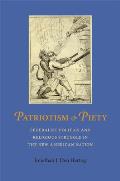“A lack of attention to historical methods and thinking”
Earlier this month Jonathan Den Hartog, professor of history at Samford University and author of Patriotism and Piety: Federalist Politics and Religious Struggle in the New American Nation, shared an essay at Current: “Scooby Doo and the Black Robe Regiments.”
Current describes itself as “an online journal of commentary and opinion that provides daily reflection on contemporary culture, politics, and ideas.” Its executive editor is Prof. John Fea of Messiah College, and a lot of the other editors of all kinds are drawn from Christian colleges.
Den Hartog describes his exploration of online essays about the “Black Robe Regiment” of the American Revolution:
Current describes itself as “an online journal of commentary and opinion that provides daily reflection on contemporary culture, politics, and ideas.” Its executive editor is Prof. John Fea of Messiah College, and a lot of the other editors of all kinds are drawn from Christian colleges.
Den Hartog describes his exploration of online essays about the “Black Robe Regiment” of the American Revolution:
Now, I knew this was a metaphorical description, not an actual historical organization. Some ministers had supported the Revolution and others had become military chaplains, but they had never formed their own units. I also knew that the term itself didn’t come from Americans themselves but from an embittered Loyalist, Peter Oliver, writing a jaundiced account of the Revolution from London, who decried the “Black Regiment” in Massachusetts. (On this front, J.L. Bell has done a great job of tracking down those original references.)Den Hartog proceeds to show how these copy-and-pasted essays fail on some basic elements of historical study: chronology, context, and complexity. For specifics, see the rest of the essay.
Reading up on these contemporary moments I discovered several “Black Robe Regiment” websites, including “The National Black Robe Regiment.” In seeking out its supporters and roots I read laterally, using techniques recommended by Sam Wineburg. It was then that I realized that the “National Black Robe Regiment” site had in fact been set up by David Barton’s Wallbuilders organization. Here was the “aha!”: The organizations were linked, so it would make sense to be on the look-out for shared approaches to the past among them.
My growing understanding of their approach led to a more critical eye in reading their accounts, which mirrored the patterns of other Wallbuilders presentations. This was apparent in their article “History of the Black Robe Regiment.” In multiple ways such writings reveal a lack of attention to historical methods and thinking.


1 comment:
Hi John
Interesting analysis! The links to the Black Robe Regiment are broken. Maybe the referenced page has been taken down by the author.
Post a Comment